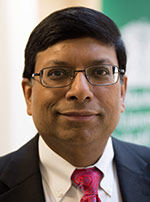A gastroenterology research group led by a vice dean at a medical school has requested that a journal correct a paper with an image duplicated from an earlier study by the same group, Retraction Watch has learned. The journal has not yet determined what kind of notice to place on the article.
The group’s leader informed us of the correction request in emails asking us to remove a comment on a post from June pointing out the duplicated image. He also told us that he requested the correction before his employer received an allegation of research misconduct and started an inquiry, which found he and his group had not committed research misconduct.
Uma Sundaram, vice dean of research and graduate education at the Joan C. Edwards School of Medicine of Marshall University in Huntington, W. Va. and chair of the department of clinical and translational science, is corresponding author on both of the papers that share an image. Sundaram also has a dual appointment at a VA medical center in Huntington.
Continue reading Med school vice dean says he’s correcting paper amid negative misconduct inquiry







